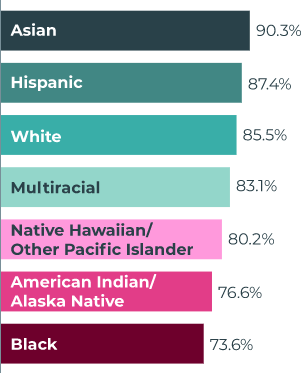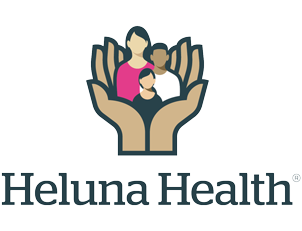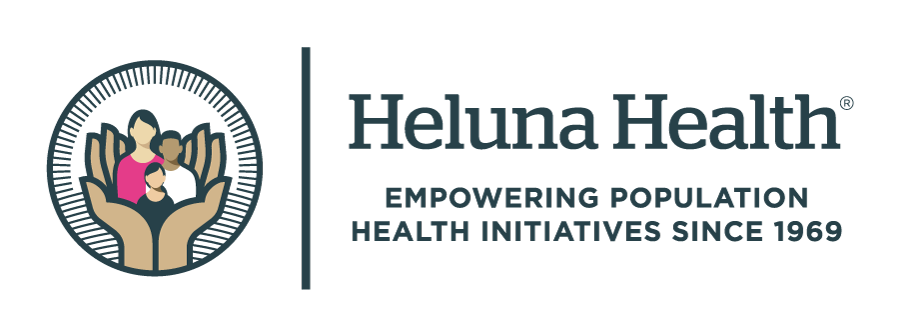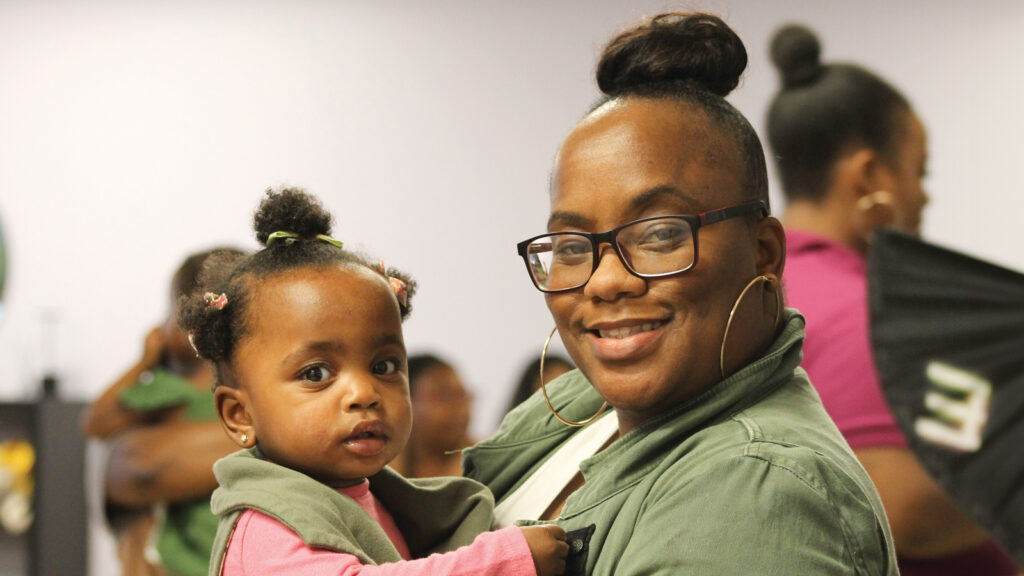In the Crenshaw District of South Central Los Angeles, within the Obama Women, Infants, and Children (PHFE WIC) program office, is a well-appointed suite decorated with purple couches and lounge chairs, pastel-colored walls, potted plants, a children’s play corner, and a kitchen area. When entering the space, visitors should feel at home. Opened in August 2023, this is the first dedicated center for CinnaMoms, the Heluna Health program focused on serving Black/African American women.

Chiang, et al., Racial and Ethnic Disparities in Breastfeeding Initiation—United States, 2019. MMWR Morb Mortal Wkly Rep 2021;70;769-774.
“This space is about rest, nest, and connect,” says Dr. Toncé Jackson, co-founder and Director of CinnaMoms and Senior Health Equity Manager for Heluna Health’s WIC program. “We wanted to create a space so that if women want to rest, they can do so here. Nesting refers to preparing for birth—preparing for the next chapter in a pregnant woman’s life.” As for connecting, Jackson says, “We want families from the Crenshaw District to connect with each other and to the larger maternal health system” when visiting the CinnaMoms center.
CinnaMoms Crenshaw was created with funds from Heluna Health. Eventually, Jackson says, there could be a dedicated CinnaMoms space in every WIC location in Los Angeles neighborhoods with a sizable Black population. But Jackson would also like CinnaMoms to spread beyond the L.A. region, even to other states.
Disparities in health outcomes show that there is a clear need to help Black mothers through their pregnancies and in the immediate years after they have given birth. Black women are three times more likely to die from a pregnancy-related cause than white women, and are also more likely to be hospitalized for postpartum depression than women from other racial or ethnic groups. And while the advantages of breastfeeding are widely known, Black women have the lowest rates of starting and continuing breastfeeding compared to other racial and ethnic groups in the U.S. For the women it serves, CinnaMoms provides the resources and information these women need for healthy birth and postpartum experiences.
Jackson got the idea for CinnaMoms in 2015, when she was leading breastfeeding education in Heluna Health’s WIC headquarters. “I noticed that at our WIC, Black women were breastfeeding at a lower rate than Latinos and whites,” Jackson says. While pursuing a master’s in public health, she learned that the low rate of breastfeeding among Black women was not due to a lack of interest, but to a lack of access to lactation consultants from communities of color, the historical marketing of formula in the Black community, and other social and economic factors. Studies showed that having access to peer counselors or lactation consultants of color or support groups would help improve breastfeeding outcomes for Black women. “I said, ‘We can do something about this.’”
CinnaMoms launched in 2015, with meetings held every other month in the five local WIC centers near large Black populations. Discussions were not only about breastfeeding, but about maternal health overall, including nutrition and the importance of doulas and midwives. In 2021, CinnaMoms received a grant from the U.S. Department of Agriculture, enabling Jackson to hire three peer staff members, to conduct outreach, and to survey CinnaMoms participants. Positive survey results helped convince Heluna Health to invest in a dedicated CinnaMoms space.
During the COVID-19 pandemic, when Heluna Health’s WIC transitioned to remote services, CinnaMoms began holding its support circles through Zoom. While virtual meetings are easy to attend, they cannot replace the intimacy of in-person interactions, which informed CinnaMoms’s decision to open the Crenshaw space.
For Jackson, opening up more CinnaMoms spaces is one part of her effort for empowerment. “I want to create an ambassador program, so we can show other WIC agencies how to replicate CinnaMoms,” she says. “This feels good,” Jackson says. “It reminds me of the power of creativity, the power of support from our leadership, the power of having a vision and seeing it through. We’ve been able to create a community. Hearing our families say, ‘This is for us,’ was a vision realized.”





